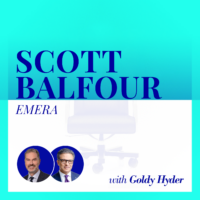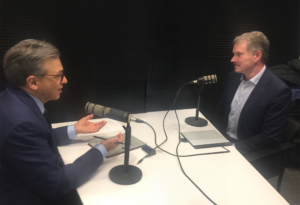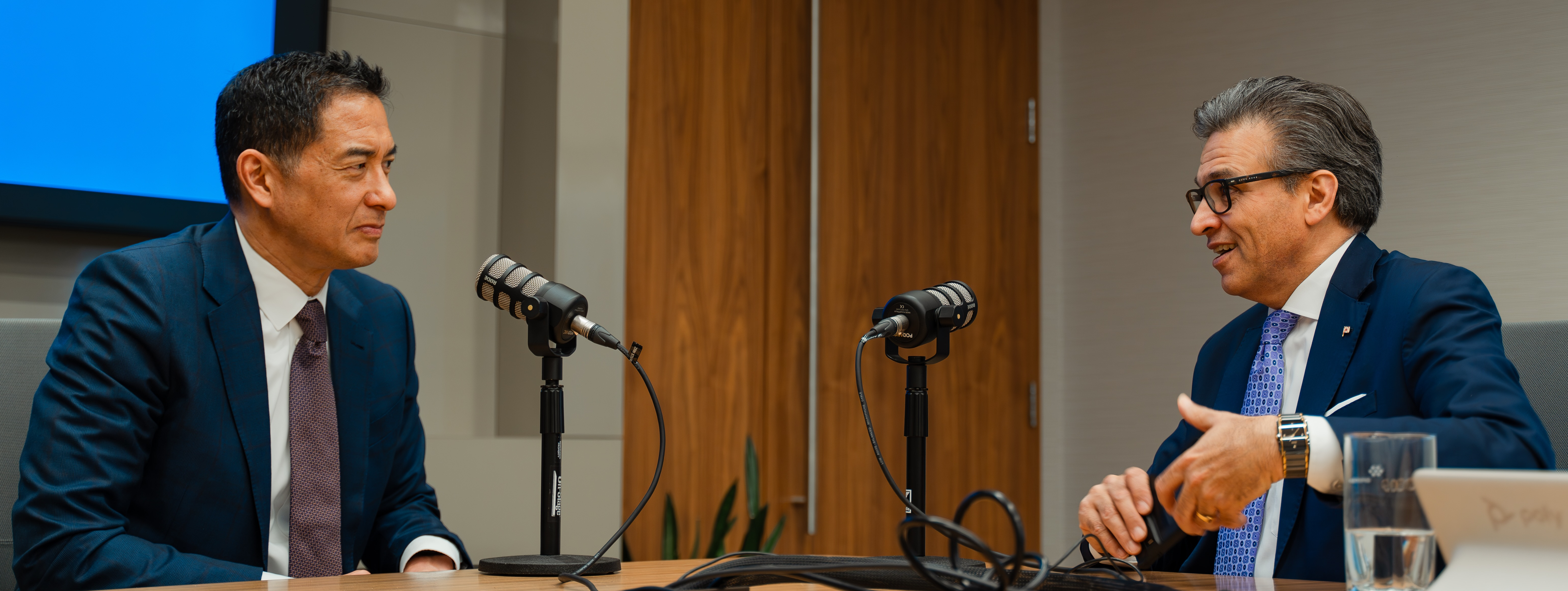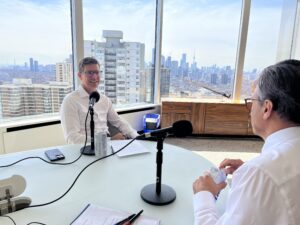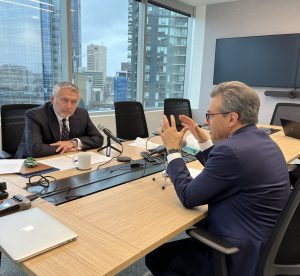Is Canada poised to be a winner or a loser as the world transitions toward cleaner sources of energy?
Charles Brindamour, the CEO of Intact Financial Corporation – the country’s largest provider of property and casualty insurance – is convinced that Canada has everything it needs to be a global leader in the drive to net-zero greenhouse gas emissions.
He points to the country’s highly skilled and diverse workforce, its robust energy supplies and its abundant natural resources as areas in which Canada has huge advantages.
“Whether it’s around industrial and natural carbon capture, whether it’s about building on our strengths in renewable energy, or playing a massive role in the electrification of transportation, these are great opportunities for the country,” Brindamour tells Goldy Hyder in the Speaking of Business podcast.
Brindamour says he began to see the effects of climate change more than a decade ago. His company responded by creating the Intact Centre on Climate Adaptation to help communities become more resilient to climate-related natural disasters.
In February Brindamour was named Canada’s Outstanding CEO of the Year, an award he says he shares with his entire team. “We very much think about Intact as a collective project to build a Canadian champion. And I’m hoping that this prize will help inspire others to do that – because we need more Canadian champions.”
Listen to Goldy Hyder’s conversation with Charles Brindamour on the Speaking of Business podcast.
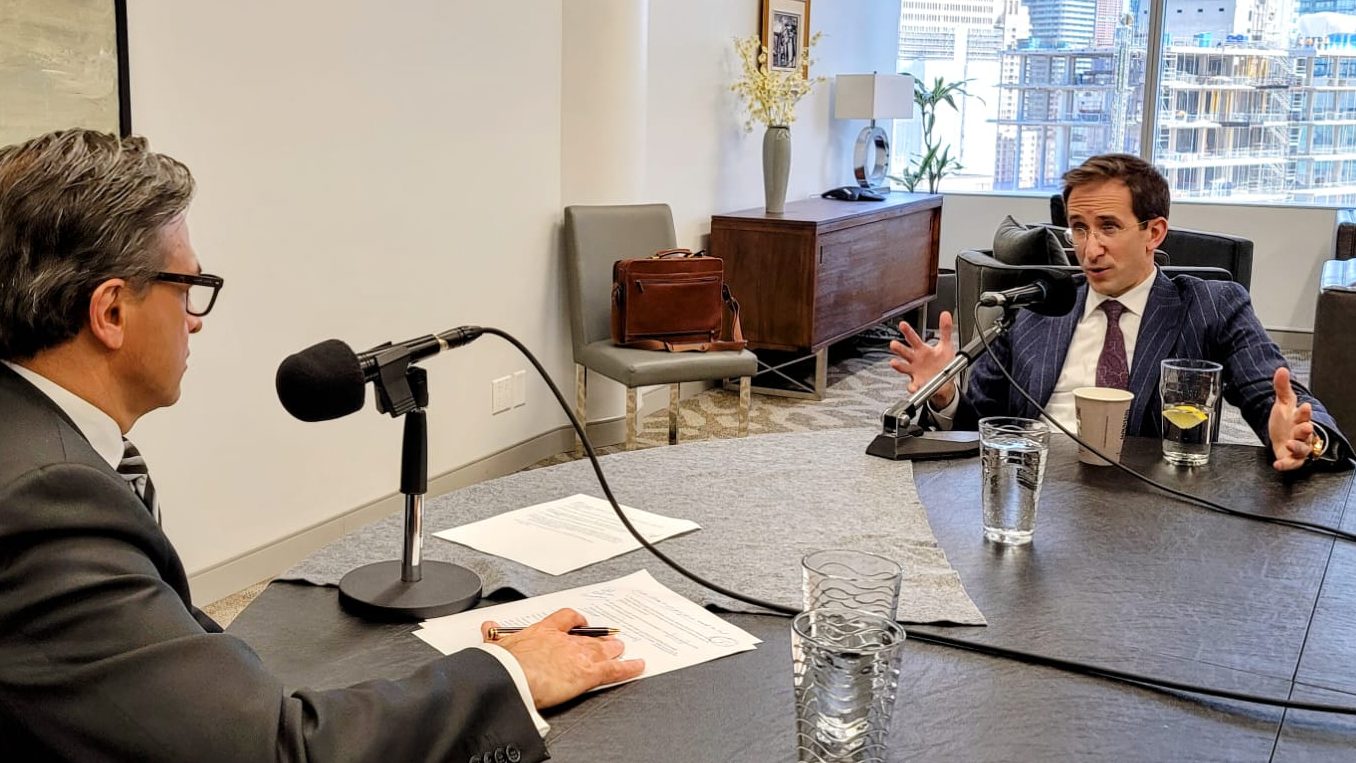
Charles Brindamour:
As a nation, we need to stop obsessing over our weaknesses and totally turn our attention towards our strengths and focus on that. What are those strengths? Labour, energy, and resources and minerals. I think that our policies should be all about investing there and growing that.
Goldy Hyder:
Welcome to Speaking of Business, conversations with Canadian innovators, entrepreneurs, and business leaders. I’m Goldy Hyder, president and CEO of the Business Council of Canada. I’m sitting in the office of Intact Financial Corporation in downtown Toronto. Intact is an amazing Canadian success story with roots dating back to the early 1800s. Today, it is the country’s largest property and casualty insurance company. In fact, one in five Canadians and one in four small businesses are insured by Intact, and full disclosure, that includes me.
Goldy Hyder:
At the company’s helm is CEO Charles Brindamour, who in February was named Canada’s Outstanding CEO of the Year. The highly prestigious award recognizes a business leader who exemplifies integrity, insists upon excellence, earns the trust of others and has built a globally competitive organization. I think you’ll find they chose wisely. It’s such a pleasure to be able to sit down for a conversation with Charles today. Welcome to the podcast, Charles.
Charles Brindamour:
Thanks, Goldy. And thanks for your business.
Goldy Hyder:
Two decades of it, so you’re more than welcome. Look, let’s start with the big news I mentioned in the introduction. Congratulations on being named Canada’s Outstanding CEO of the Year. It’s got to be a pretty good feeling. I know many of your peers and it’s a tough crowd. What does it mean to you?
Charles Brindamour:
Well, first of all, of course I’m honoured by the recognition, but I think it is a team recognition. It’s sending a very strong signal to my team that we’re focused on the right thing. And I think that we very much think about Intact as a collective project to build a Canadian champion. And I’m hoping that this notion of building a Canadian champion, this prize will help inspire others to do that because we need more Canadian champions.
Goldy Hyder:
Let’s talk about that. How do you do that? What’s the secret?
Charles Brindamour:
Well, outperformance is certainly a big portion of the secret. It’s benchmark yourself against the best in the world and stick to your strengths. And so in our case it’s really focusing on data, on artificial intelligence, on claims, supply chain management, second-to-none customer experience, repeat year after year after year by being focused on your strengths. And I think that makes a big difference. The other key ingredient, and we define success beyond customers being advocates of Intact, is to make sure we’re the best employer where we operate. That’s our second definition of success. Because if you want to create a world class operator, an outperformance on a sustainable basis, you need loyalty and loyalty goes through engagement. And the last point, which is really important, is to be values driven in how you run the business. That’s what drives sustainability over time.
Goldy Hyder:
One of the things you didn’t mention, and I want to ask about is what’s the role of policy. In the environment, in which we’re operating globally, money follows message, as they say. Why Canada? Why would businesses choose Canada as the place to grow that champion?
Charles Brindamour:
I think policy is important, but it’s secondary in my mind, you ought not to wait on government signals to figure out the opportunities in the marketplace and what your strengths are in my mind. I think Canada’s a great place to be to build a Canadian champion. We have tremendous strengths from a labour point of view. Right? We have some of the best educated labour in the world. We’ve got a tremendous immigration policy. There’s great representation of women in the workforce, which really helps drive the diversity agenda, and in my mind, it’s a great strength to build a business from. And so that would be number one in relationship with Canada. The second thing is that we’re very close to the U.S. We have very strong social makeup as a country and therefore strong social makeup, massive opportunity set just south of the border is a tremendous advantage for us. And I think just the can-do attitude that you can find here in Canada is the sort of mindset you need to build a champion.
Goldy Hyder:
Part of that, of course requires leadership. The opportunity can be there as you pointed out, but you need the right kind of leader for the moment. Now you came in as CEO in the financial crisis in 2008, and here we are speaking in March of 2022, hopefully coming out of the pandemic crisis that we’ve been through. I’m wondering, first of all, how did that experience of the financial crisis prepare you better or enable you to manage this crisis? You did it. And how have you evolved as a leader managing those crises?
Charles Brindamour:
Goldy, I think that the team at Intact is really energized by big problems and by crises. And it’s part of our ethos to step up when the world is dislocated to gain big opportunities, and I can point to the RSA acquisition, our largest in our history that was done during the pandemic. But if I step back and think about leadership, for me, the great financial crisis was clearly an important point, but what prepared us for the great financial crisis in my case, my first leadership experience was in Romania in the 90s, after the wall fell, it was my first job as a leader. And you could take nothing for granted in the post-communist era. And so I’ve learned about resilience, being resourceful, because you can’t take anything for granted. But the other thing I learned in Romania, because we built this business from scratch, was the importance of talent and horsepower. And I would say this really shaped my perspective on how to build a great company, because we always over-index on horsepower here at Intact.
Charles Brindamour:
Then moving to the financial crisis, what did I learn or what did it reinforce for me? I guess three things. The first one would be the importance of discipline and prudence in building a business. Because you want to make sure when you get in big periods of dislocation, you want to be in a position of strength. That’s our mindset. That’s our thought process here. We entered the financial crisis with very strong operational performance just as we entered the pandemic. So discipline and prudence, super important. The second key point, I would say, Goldy, is the leadership ability to create energy around problems. You don’t want problems to hold you back. You want people to be energized. And I would say that this is a great feeling actually. When you’re in front of adversity, people just want to find the opportunity in it.
Goldy Hyder:
The person who wants the ball with two seconds on the clock give him the ball.
Charles Brindamour:
Exactly right. It’s important though that you do that from a position of strength, but that’s the second key element. And I think the third reinforcement for me was the importance of values. We created Intact on the basis of very strong values. When we announced the creation of Intact in early ’09, we basically said, here’s the deal, we’re re-domesticating this company, it’ll be called Intact. And here’s what we believe in, five values which we’ve transformed the organization over to really make sure that this is not a poster in the cafeteria, but this is really how we behave as a firm. And so prudence and discipline, energy around adversity and values, I would say, are the three big lessons out of the financial crisis, and it really shapes Intact.
Goldy Hyder:
You know, that’s really rich content. Thanks for sharing that. As you were speaking, thinking about how our governments did in those things as well, and maybe there’s something there to come back to. But I do want to… speaking of coming back, this is the second time we’ve had you on this podcast. And the last time we were there was the beginning really of this pandemic crisis that we had spoken of. And something that you said that stayed with me and it’s related to 2008, which some people feel was a catalyst for a society that wants more from business than business was giving them, that the whole shareholder model versus the stakeholder model. Some feel that 2008 was the roots of that. Fast forward now, 14 years later, so much has happened in that arena. And you said something when we last spoke that really stuck with me, let me play that clip for you.
Charles Brindamour:
The bigger a question for me is how do we come out of this stronger as a nation? And I think big businesses who have played an important part in the development of the country need to step up our game to find solutions to society’s problems, income disparity, skill gap, big businesses need to step up to address a number of these issues where they can.
Goldy Hyder:
So what’s the answer to that now?
Charles Brindamour:
Well, let me first provide some context as to why this is a core belief of ours. As we build this business, we think the way to create sustainability is to find the overlap between winning as a business and helping society. And that’s where we like to play. And in fact, if you go to why we exist as a firm or what some people would call our purpose, it’s very clear it’s to help people, businesses and society do well in good times and be resilient in bad times. That’s how we think about the business. And I think finding that convergence in building a strategy in Canada’s industrial base would make a huge difference to help Canada deal with some of its some of its issues.
Charles Brindamour:
What have we learned during the pandemic? I mean, many things that the government did actually worked well. I think it gave us as a nation a sense that we can move the dial very quickly. We can mobilize. And I think we need to build on that as we look at the big issues we have as a nation. Climate transition being one, social inequality being another one, lack of productivity being another one. I think we need to build on that momentum, this ability to mobilize and the ability to focus.
Goldy Hyder:
Let me build on that by asking about sort of the moment we’re in now, which is really about the restart, moving from the crisis to whatever the normal is going to be. Here we are in downtown Toronto, it’s still pretty quiet. Not a lot of traffic, not a lot of activity in the PATH as it’s known here, and that’s reflective of a lot of the cities I’ve traveled to in Canada, but outside of Canada doesn’t seem to be the case. How do you feel about where we are on the restart?
Charles Brindamour:
Well, I feel that we are in a position in Canada where there’s lots of big opportunities around us, quite frankly, and I won’t get into how do you bring people back to work? I think everybody’s talking about that. Everybody has a view and it’s just a question of time because this distance is a problem. I think to create trust in an organization when you don’t see yourself, when it’s all transactional, it’s hard to do. We clearly have an opportunity to provide more flexibility to our employees and to Canadians, but where are we now? So we’re in an environment where demand is very strong and that’s why I’m saying a number of the things that the government has done are actually working. We have to recognize that. We’re in an environment where geopolitical tensions, it’s dramatic, and our hearts are with the Ukrainians, but the dislocation that creates though plays to Canada’s strengths, and I think we need to build on that. I think that the climate transition is a big one.
Goldy Hyder:
Yeah, we’re coming to that one.
Charles Brindamour:
Right. It’s a deep trend for the next 100 years. I think there’s a big opportunity for Canada. We have to play offense on this one, not just defence. But I think what we’ve seen during the pandemic is we can mobilize, we can turn around quickly, we can move fast, we can invest and …
Goldy Hyder:
We can partner.
Charles Brindamour:
And we can partner. And so that’s the mindset we need to be in at this stage. The only word of caution, Goldy, I would say is that we need to maintain fiscal prudence because we were able to step up during the crisis. And as I said, I think it worked, but now things are going really well. We need to prepare for the next crisis. There’s lots of things we can do as a nation to mobilize that don’t cost money and I think we should concentrate on those a little more.
Goldy Hyder:
Well, it’s in the citizen’s interest that happens because of inflation. Right. I think we all have to be conscious of adding fuel to the fire when the economy’s actually doing pretty well.
Charles Brindamour:
Exactly.
Goldy Hyder:
But don’t you feel there’s a bit of a disconnect in the sense that all the data says things are great, but people aren’t feeling it. Why do you think that is?
Charles Brindamour:
Well, because I think it is uneven across society. So Canadians are concerned indeed about cost of living. Canadians are concerned about jobs. Canadians are concerned about climate. You’ve seen the Edelman Trust Barometer a few weeks back. It is very clear. I think it is quite uneven across society. Though, I would say in relative terms, Goldy, our tax system, our social programs are amongst the best in the world in terms of keeping society together. And I think we stack from an income distribution point of view, very, very well against… We’re at the top of the OECD in that regard, and I see that as a strength, quite frankly.
Goldy Hyder:
But you need growth to pay for that, right?
Charles Brindamour:
You need growth to pay for that and therefore, that’s why when you ask me, where are we coming out of the pandemic? I’m saying, we need to have our eyes on the opportunities here and align capital and our priorities towards growth.
Goldy Hyder:
Now, you just mentioned that there’s a lot that we can do to prepare for the next crisis and that it doesn’t necessarily cost money. What are you thinking?
Charles Brindamour:
Well, I’ll give you a principle and then I’ll give you a concrete example. So a principle would be that risk management as a core expertise is not embedded in the fabric of the country and in how we run government. And I think that just integrating that skillset, we have lots of ways to do that ranging from defence and the role of the army in risk management as a nation is a very good example for me of bolstering our resilience without spending money.
Charles Brindamour:
Another very concrete example, Goldy, is that it’s not more expensive to invest in climate resilient infrastructure than to not do it. Yet the dollar spent generates $3-$6 of savings. So integrating risk management in how government leads, for me, is something we should be deliberate about. Not costing. Thinking about resilience and how we spend is clearly another area. And I think something that doesn’t cost money that would accelerate the speed at which we change as a nation is clarity of priorities and clarity of signals. That doesn’t cost money. It’s hard to do. I recognize that it’s hard to do even in a business, but I think given the challenges we have as a nation, we need to be more focused and the signals need to be clear. Capital will follow and you’ll see acceleration as a result.
Goldy Hyder:
Yeah. Well, let’s talk about climate, because you put it on the table. I want our listeners to know, first of all, your own commitment to this goes a long ways back. You’ve been working very closely as a co-chair of the Business Council of Canada Climate Working Group, which consists of over 30 CEOs cross-sectorally, nationally. You co-chaired that previously with Dawn Farrell, former CEO TransAlta, now Susannah Pierce CEO at Shell and throughout it all, I have seen your, passion’s probably not the right word, but your resolve and your commitment to get this right. And I want to ask you first, when did that kind of light bulb go on for you, that thought, this is going to be a really big issue and a really big problem and I need to do something about it?
Charles Brindamour:
Probably 15 years ago, Goldy, when we woke up one day as a business and we were spending $1.10 to $1.15 for every dollar of revenue to protect Canadians. And by the way you said, we protect one in five families, it’s actually one in four now because we really grew our business during the pandemic as you know
Goldy Hyder:
Your successful close of the RSA acquisition probably changed that number.
Charles Brindamour:
So it’s one in four, and indeed at least one in four small to midsize businesses. And so we’ve been on the front line of the consequences of climate change where protecting Canadians became over a decade ago, something really, really difficult to do. And we had an existential question we had to solve at that time. And this was rooted in the fact that natural disasters have increased by a factor of four over the last 30 years and my perspective is that this trend is not going to stop. And that’s why in being really focused on transition, we all need to keep our eyes on adaptation and resilience because the cost associated with natural disasters is not coming down as we certainly have seen this year and in the past few years.
Charles Brindamour:
So what did we do as a firm to resolve this existential question? Back to this spirit of energy around problems, we totally reinvented how we did home insurance. We changed the data we collected. We changed how we priced. We changed the structure of the product to make sure we covered against specific perils. We invested in prevention.
Goldy Hyder:
Even bought a home restoration company, I think.
Charles Brindamour:
We bought a home restoration company. We think it’s a great opportunity. We changed how we manage the exercise of getting Canadians back on track, we call that claims, to have a service model that is second to none, even in periods of natural disaster and went deep in the supply chain, and this is where the acquisition of On Side comes in, because I felt there was a big capacity issue in that space and quality issue and we thought we can resolve that. And this turns out to be a great business growing really fast.
Charles Brindamour:
So in the last five years, protecting Canadians has been our fastest growing business and one of our most profitable business. And so this for me was, here’s how you deal with adversity, turn it into an opportunity. And then, Goldy, we said, well, in terms of helping society, what have we learned from our own transformation to help cities, the provinces and the federal government adapt as well, and that’s when we created the Intact Centre on Climate Adaptation, which has been such a dynamo on the adaptation front here in North America and I think has had a big impact with elected officials.
Goldy Hyder:
Tell us more about that. Because I know some of it came from sort of the consequences of 2021. We saw massive fires, floods, a heat dome, plunging cold. You just indicated that more of that to come, likely. How is this going to make a difference?
Charles Brindamour:
I think it is making a big difference and has started to make a difference, because we’ve been at it for a decade with the provinces, municipalities. Our message is future-proof infrastructure. Our second message is build right and build in the right place. And our third message has been double down on natural assets and natural infrastructure, think wetlands for instance, because these are key mitigators of damages and the government actually invested along those three angles.
Goldy Hyder:
Good for them, because these aren’t exactly sexy vote-getters.
Charles Brindamour:
No, exactly right. It’s not like building an ice rink. Right. And some of it is …
Goldy Hyder:
The sewer system isn’t seen very clearly. Yeah.
Charles Brindamour:
But it’s holding back prosperity.
Goldy Hyder:
And increasing costs for Canadians for their insurance at the other end.
Charles Brindamour:
Exactly. I think the point we’ve made with governments is that every dollar invested in adaptation can generate $3-$6. And so I think it’s very real for Canadians and as a result, fair bit of progress has taken place so far.
Goldy Hyder:
Now you had said that on the issue of government’s role in climate change, that what we need is clear focused consistent policies. And we’re talking on the date that the government is going to be announcing its plan for how to reduce emissions for their 2030 targets. How important are the policies again on the question of capital formation, innovation in terms of being able to meet some of these very ambitious targets we’ve set for ourselves. For context, I think we’ve reduced emissions 1% since 2006 or 2007 and we set a goal for 45% in 2030, which is less than eight a half years away here. Are we going to do it?
Charles Brindamour:
Yes. I think that the first point I would make, Goldy, which is important for us all to understand is that this is not the government’s problem. This is society’s problem and as a result, businesses have a big role to play here. Consumers and Canadians broadly speaking have a big role to play as well, I’m encouraged by the Edelman results, which says this is number two for Canadians. This should help create momentum. And thirdly government has an important role to play. And so my point on priorities is that when you have a big problem, you cannot be all over the place. You need to pick your spots, stick to it and invest massively and I think this message-
Goldy Hyder:
It’s more of a go all in strategy.
Charles Brindamour:
Yes, exactly. This message is recognized and understood, I think, and you want to build on the strengths we have as a nation and you want this to turn as a growth opportunity, not just as a defence opportunity and therefore our priorities we’ve communicated as you know very well, Goldy, whether it’s around industrial and natural carbon capture, whether it’s about building on our strengths on renewable energy, where we have 82% of our grid is renewable or playing a massive role in the electrification of transportation. These are great opportunities for the country, but we cannot be all over the place if we want to move the needle.
Charles Brindamour:
And on capital formation, as someone who deploys capital, what’s important is that the signals we’re getting from government are consistent, are clear and are aligned with the key priorities where the government is focused. And I think when you get those consistent signals, you have a good sense of where the government is going it gives you a good degree of confidence to invest along these lines. Where there’s confusion, it holds back capital allocation.
Goldy Hyder:
Well, nothing like a crisis focuses the mind. Right? And we’ve got three of them. We’ve just been through a pandemic. We’re not through it yet, but we’re certainly a long ways along. We’ve got the war and we’ve got the climate crisis going. So let’s hope that you’re right about the focus. A lot of attention has been given to the supply side of the equation, and we don’t talk a lot about the demand side. Do you think there’s a risk that the public who’s all in on the importance of climate change, as you said, number two issue, they haven’t had to really put much skin into the game to get there just yet. How much risk is there that when the rubber hits the road and the costs rise for people that we have to keep the social license, if you will, to keep going to do the right things. Are you at all concerned that we put all the emphasis on one side and not enough on the other?
Charles Brindamour:
I am concerned. I’ve expressed optimism around the fact that Canadians are saying, this is our number two issue precisely to your point. I think midterm as a nation, beyond climate, what we have to manage as a risk is one where cost of living is going up meaningfully. Yet the growth in the country is not what it is today. Some people call that stagflation.
Goldy Hyder:
… or two percent trap that we’re experiencing.
Charles Brindamour:
And that’s why my perspective is government needs to keep some fire power to fight a period of high inflation and low growth. That’ll put some pressure. I think the government has a role to play, to help consumers deal with the fact that the climate transition will be more costly for a period of time in particular around energy. You know, we’ve got serious supply issues in relationship with energy as the geopolitical issues, but there’s been much less investments in traditional …
Goldy Hyder:
Not just geopolitical. The choices that they made. They turned off nuclear prematurely to think that renewable would work. You know, the gas is reliant on Russia. Don’t you think this is a moment where we actually have to be driven by the facts, that we have to get serious about what the actual facts are in terms of what the energy transition’s going to look like. Because there’s a side over here that just says shut it all down.
Charles Brindamour:
Yeah. No, I think we need to be pragmatic indeed and we need to build on our strengths as a nation. I do think that we need to be far more focused on exporting our products and I think that there’s a lot of momentum to improve our footprint from a carbon point of view in the energy sector. Big time.
Goldy Hyder:
Look as we wrap up, there’s a couple of just quick questions I want to ask you. I guess one’s a big one if you want it to be, but we’ve been asking everybody this season, what is one big idea that you think could really help transform Canada?
Charles Brindamour:
Let me start with a big principle and you will have picked up on that in how I approach things. But as a nation, we need to stop obsessing over our weaknesses and totally turn our attention towards our strengths and focus on that. What are those strengths? Labour, energy, and resources and minerals. I think that our policies should be all about investing there and growing that. And I would say the big idea would be to make Canada the uncontested leader in clean energy.
Goldy Hyder:
We can do it.
Charles Brindamour:
We totally can do it. We have very strong position to start from, and we should build on that.
Goldy Hyder:
Tell me the best book you read on climate.
Charles Brindamour:
The best book I’ve read… I’ve read lots of books …
Goldy Hyder:
I know I’m coming to that as my final question, but …
Charles Brindamour:
I’ve read lots of books on climate, but I will say the best one I’ve read, and the one I would encourage people to read is Bill Gates’ …
Goldy Hyder:
I’m so glad to hear you say that.
Charles Brindamour:
… latest book. You know what? Because he’s very smart and smart people have this great ability to transform complexity in simple ideas. Gates did just that-
Goldy Hyder:
In 200 pages.
Charles Brindamour:
In 200 pages, that’s it. On climate, it is way up there.
Goldy Hyder:
Now, I mentioned that you’re an avid reader. In fact, you’ve taken to posting your reading list on social media and so based on those lists, it seems to me that you read a very wide range of books. I’m wondering what you look for in a good read?
Charles Brindamour:
I used to read only nonfiction, Goldy, because ..
Goldy Hyder:
Yeah, that sounds familiar.
Charles Brindamour:
Yeah, because I have an inferiority complex when it comes to knowledge of history and so on. Maybe because I worked in Europe early in my career and I was a specialist and I didn’t know much other than …
Goldy Hyder:
You’re an actuarial scientist. Let’s put it out there.
Charles Brindamour:
And so I tried to learn about translating what history can teach us for what we can do today and it’s with the lens of the country, but it’s also with the lens of me as a leader, quite frankly. And so I don’t read management books, I read history to inform how I can become a better leader. And then on fiction, I started reading fiction during the pandemic because reality was kind of hard to bear day in, day out. And I started to read big classics in English in particular because I was raised in French and had never any exposure to those. And so …
Goldy Hyder:
Such as? Like what, Shakespeare or something?
Charles Brindamour:
No, no, no. More 20th century classic, Hemingway, Francis Ford, Maddox and Fitzgerald and so on. Kafka and …
Goldy Hyder:
You’re a speed reader on top of it all. So you can really get through some of this stuff.
Charles Brindamour:
Yeah. Well, maybe not at full speed on those, but I think what you learn there beyond getting out of reality, you learn about societies and how they lived at different points in time. And that’s very instructive to me and it makes you reflect on how good we have it here in Canada in 2022. But how fragile, what we have is, I would say, is my big lesson from reading fiction.
Goldy Hyder:
Wise words, not just for the end, but throughout the presentation in our podcast today. Thank you for sharing your vision, your thoughts, your passion. It’s inspirational.
Charles Brindamour:
Thank you very much, Goldy.
Goldy Hyder:
Charles Brindamour is the CEO of Intact Financial Corporation. I’ll be back in two weeks time with a conversation with Penny Wise, president of 3M Canada. If you’ve been enjoying our Speaking of Business conversations, please give us a review on your favorite podcast platform and remember to subscribe. Search for Speaking of Business, wherever you get your podcasts, or simply go to our website at thebusinesscouncil.ca. Yep. That’s thebusinesscouncil.ca. Until next time, I’m Goldy Hyder. Thanks for joining us.







